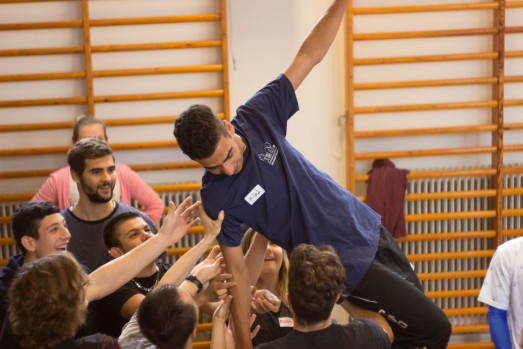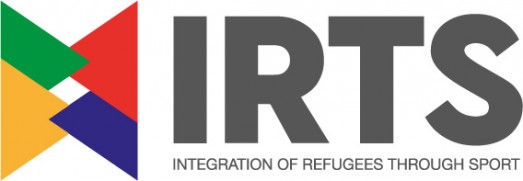“Physical activity can’t change our situation, but it can change how we feel”: Refugees talk about the realities of sport and integration
31/10/2017

Photo from Ollerup Academy of Physical Education activities with refugees.
Having the chance to meet face-to-face and chat with people who are subject to so much turmoil and political debate was a humbling experience for all of the partners of the Integration of Refugees through Sport project. But the positive spirit of the 20 young men we met put us more at ease, as they tried to communicate to us in English and Danish, cracking a joke here and there.
The conversation became even easier after the more formal group interviews when one of the young men from Afghanistan immediately found two things he and I had in common, as I am from a cricketing nation and a fellow foreigner living in Denmark.
“I really like talking to you because you know about cricket,” he said, smiling, before switching to a more heart-wrenching subject without warning. “You know, I’m tired. I didn’t sleep last night because I’m worried about my friend. I don’t know where he is.”
This pendulum swinging from laughter and easy chitchat to sobering stories and worries also characterised the interviews we conducted in small groups of 5-7 refugees. This was a rare opportunity to break through the surface of the distant figures we see in the media, and hear their personal perspectives and realities first-hand. What we heard was often touching and even inspiring.
The main subject of the interviews was the potential for sport and physical activity to assist their integration, and the young men often talked about safety as a key concern, barrier and enabler.
One of the two stronger English speakers in the group explained that his family didn’t let him play cricket in Afghanistan after bombs started being planted in local pitches.
“It was super dangerous to do cricket,” he said. “When I came to Denmark I saw a safe life. It’s safe to start activities. After six months of going to a cricket club in Odense, I moved to Ærø where there was no cricket club. So I started doing yoga. It’s good for stress and it’s very fun. I participate every time – I never miss a class.”
When we asked them about opportunities for female refugees to join in their activities or other community sport, they replied positively and enthusiastically – as long as it would be safe for them.
“Make it a safe place for girls so they can come and participate. Some families don’t want their girls to come to a boys’ club and train. You should talk to the families and say they can go because it’s a safe place.”
A football fan in the group spoke up loudly in Danish: “The girls have to decide themselves. There should be a mix. Everyone should be able to enjoy playing football.”
Opportunities and barriers to participating
The group said their involvement in community sport and physical activity has come from their own initiative and the opportunities Morten Andersson made them aware of through his programme. It also highlighted the power one individual can have to make a difference.
“The first time we came to Denmark we were shy and couldn’t talk to anyone. After two weeks Morten invited us to come to the Højskole (Ollerup Academy of Physical Education) and for other schools to come to our school. That was Morten doing that for us,” the second strong English speaker said.
“Morten wasn’t like a teacher to us, but like a father to us. He helped us live in Denmark. Morten make [sic] us at the asylum school.”
When they independently found out more about their communities and what was available to them, they tried to get a foot in the door at local clubs and fitness centres. But opportunities to play sport are not free and there are still many barriers, aside from their legal status in the society, that stop them from participating. When we asked some of the quieter members in the group if they would like to make a comment in their own language, they eagerly started talking about these barriers.
“It is a little bit difficult because of the money,” one of the stronger English speakers translated for a keen judo player. “You need a ticket, transport money and money for clothes. It’s too expensive in Denmark. It costs 2000kr for a membership.”
A shy member of the group suddenly spoke up about his experience playing football: “It’s funny when we go to a Danish team and they say no, you can’t play with us. You’re not talented enough. If they give us a chance we can get better.”
Sobering observations of prejudice and racism then caused some debate among the group:
“They don’t take people with black hair because they’re bange (afraid),” one said in English and Danish.
“‘Can you help me?’ ‘No,’” said another.
“Some people [say that], but not all,” another interjected.
What would a perfect sport club be for them? The answer was unanimous:
“No racism. Everyone can come. Nobody is better than anyone else.”
They also agreed it should be a common place where Danes and foreigners could mix, and not just a programme for refugees, they said. But the locals should be aware that their etiquette is not instinctive to everyone, and that they should make it clear when welcoming new members.
“It’s better to say what the rules are. If we don’t know and we break the rules, we feel bad,” one of the participants who had tried a fitness centre said.
Most importantly, they should be given a chance to participate, they all agreed.
My biggest piece of advice to myself would be…
One of the clearest messages that came from our conversations was that sport is not the magic wand we may hope it would be when it comes to integration. But the combination of a well thought-out programme developing physical, social and language skills programme delivered by a dedicated and caring individual (or individuals) can provide a positive framework that starts the integration process more effectively.
Physical activity and sport has great potential as a calming influence, escapism and a non-threatening social environment. It is also one part of the bigger picture of settling into a new community, as one of the members of the group eloquently explained:
“It helps me live today and not think about tomorrow and what’s going to happen. There was pain and stress when I arrived here. Now I’m doing a praktik (work experience) at Føtex (supermarket) and doing yoga. It’s good because it makes you feel good. It doesn’t change the situation, you can’t change it, but you can change your feeling about the situation.”
We asked the group if they could go into a time machine and meet themselves when they arrived, which piece of advice would they give themselves? The same young man responded.
“Go inside the society and don’t think about your case and work. Just go and start your life from when you come. Play football, do your praktik.”
Another confident voice followed:
“Be strong and all is well.”
With this wisdom, positivity and strength, these young men could become valuable mentors for Danes and foreigners alike – if they are given a chance.
Read part one of the story here
The Integration of Refugees through Sport project is supported by NordPlus Adult and Erasmus+. The project is developing a series of videos, including one featuring perspectives and advice from the refugees we interviewed in Ollerup. The resources will be available in 2018.
Article by Rachel Payne, ISCA


Posted on 31/10/2017 by Rachel Payne, ISCA

